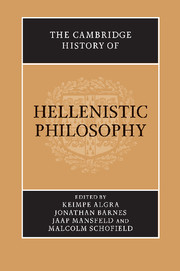Book contents
- Frontmatter
- PART I INTRODUCTION
- PART II LOGIC AND LANGUAGE
- 4 Introduction
- 5 Logic
- 6 Language
- PART III EPISTEMOLOGY
- PART IV PHYSICS AND METAPHYSICS
- PART V ETHICS AND POLITICS
- Synopsis of principal events
- Editions of sources and fragments
- List of abbreviations
- Bibliography
- Index locorum
- General Index
- References
5 - Logic
from PART II - LOGIC AND LANGUAGE
Published online by Cambridge University Press: 28 March 2008
- Frontmatter
- PART I INTRODUCTION
- PART II LOGIC AND LANGUAGE
- 4 Introduction
- 5 Logic
- 6 Language
- PART III EPISTEMOLOGY
- PART IV PHYSICS AND METAPHYSICS
- PART V ETHICS AND POLITICS
- Synopsis of principal events
- Editions of sources and fragments
- List of abbreviations
- Bibliography
- Index locorum
- General Index
- References
Summary
The Peripatetics
Late antiquity learned two logics: categorical syllogistic and hypothetical syllogistic. Categorical syllogistic studies categorical arguments. An argument is categorical if all its components (its premisses and its conclusion) are categorical propositions. A proposition is categorical if it ‘says one thing of one thing’ – or better, if it is simple in the sense of not containing two or more propositions as components. Hypothetical syllogistic studies hypothetical arguments. An argument is hypothetical if at least one of its components is a hypothetical proposition. A proposition is hypothetical if it contains at least two propositions as components.
It is a plausible guess that this terminology was developed in the Hellenistic Peripatos. The phrase ‘hypothetical argument’ is attested for Chrysippus (D.L. VII. 196); Galen says that ‘the ancients’ spoke of hypothetical propositions (Institutio logica III. 3), Alexander that they spoke of ‘mixed’ syllogisms (In Aristotelis Analytica priora commentaria 262. 31–2); and ‘the ancients’ in such contexts are usually the Peripatetics. Philoponus says that Theophrastus used the phrase ‘wholly hypothetical syllogism’ (In Aristotelis Analytica priora commentaria 302.9).
Categorical syllogistic was thought of as essentially Peripatetic, hypothetical syllogistic as essentially Stoic; and although it was known that the Stoics and Peripatetics had disputed with one another in logic no less than in ethics and physics, it was often supposed that the two syllogistics were partners, each adequate in its own area. This irenic view is misleading. The Peripatetics thought that their categorical syllogistic embraced the whole of logic: any argument which submitted to formal treatment at all submitted to categorical syllogistic. And the Stoics held the same for their hypothetical syllogisms.
- Type
- Chapter
- Information
- The Cambridge History of Hellenistic Philosophy , pp. 77 - 176Publisher: Cambridge University PressPrint publication year: 1999
References
- 30
- Cited by

